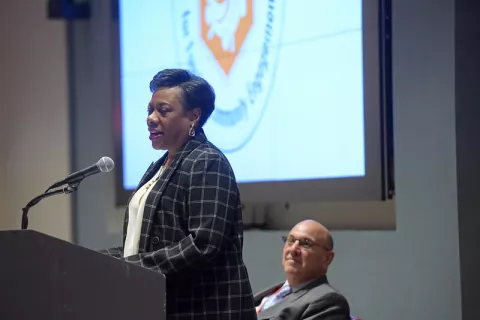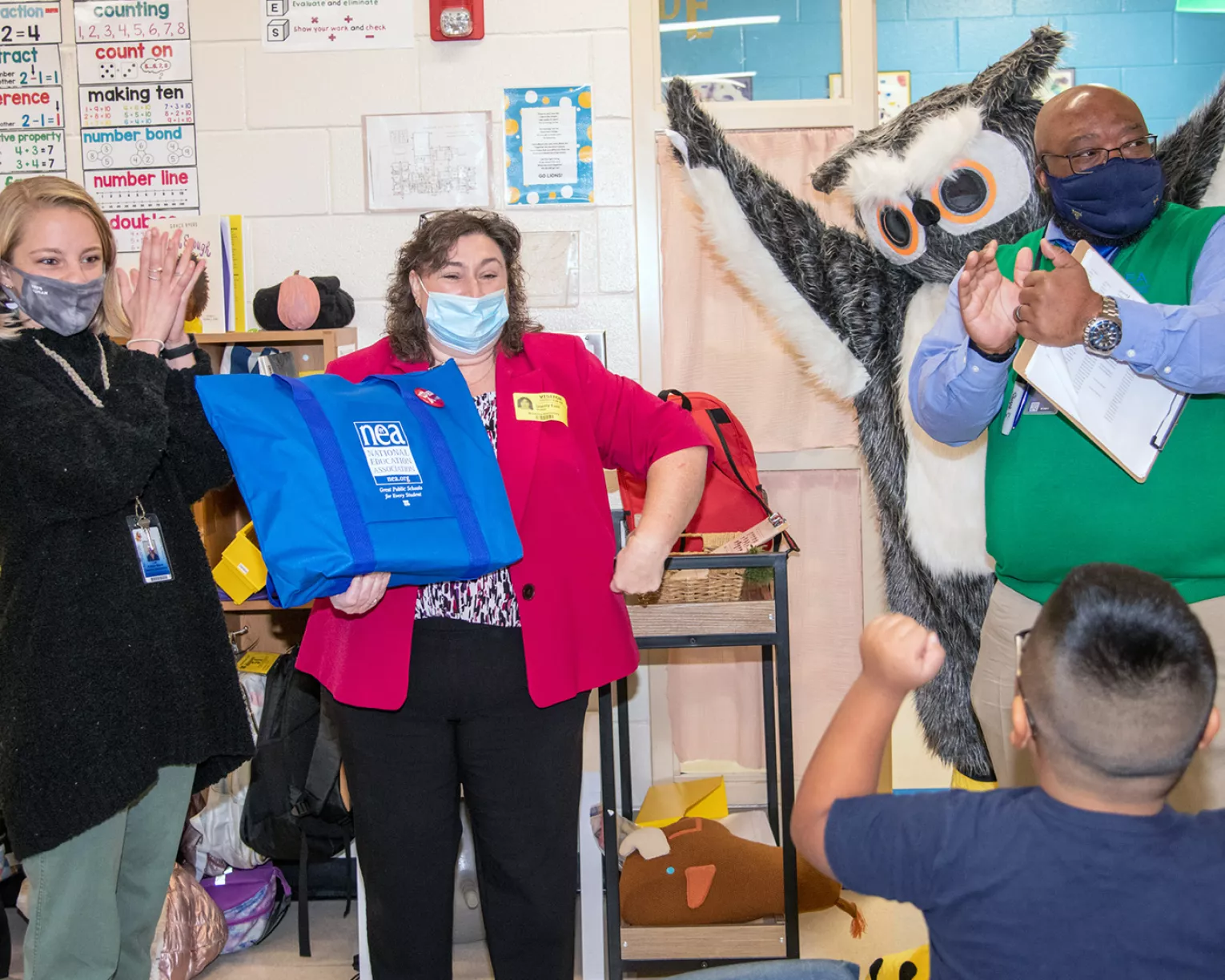
Key Takeaways
- Despite efforts to divide them, parents and educators remain strong allies.
- Teachers want more engagement with families, but there are challenges to doing it, which the report seeks to address.
- When student educators are sent into the community during coursework, they get to know families and support organizations before the first day, setting them on a path for strong partnerships.
At a time when the definition of “parental rights” and involvement in education has been twisted to mean restricted curriculum, educators are advocating for authentic parental and family engagement to improve education, not constrain it.
To that end, the Educator Preparation Symposium for Family & Community Engagement, co-hosted by the National Association for Family Support and Community Engagement, the National Education Association (NEA), American Association of Colleges for Teacher Education (AACTE), Council for the Accreditation of Educator Preparation (CAEP), and MAEC, sparked dialogue and conversation around research, policy, and practice based on a new report, Educator Preparation Framework for Family and Community Partnerships, released by the National Association of Family Support and Community Engagement (NAFSCE).
“Some would work to divide us today, but we know that our parents and our communities are allies,” NEA president Becky Pringle said as she addressed the symposium, held at NEA headquarters. “We know policies in some states do not support our students and work against what we know must be a collaborative spirit…but we will not be separated from our parents and communities.”

The release of this framework, Pringle said, “is one more tool to help us build the strong and fruitful relationships we must have between students, families and educators.”
The Educator Preparation Framework for Family and Community Partnerships provides a menu of options and ideas for reimagining how to prepare educators to engage effectively with families. It prioritizes equity, family and community assets, and collaboration among key partners including educator preparation programs (EPPs), state education agencies, schools, and community organizations.
With case studies of successful practices, the framework recommends a focus on accreditation, licensure, and high standards in EPPs, as well as the design of innovative clinical experiences and teaching methods.
Teachers Want Parent Engagement
According to NAFSCE research, 84 percent of educators would choose a school with more engaged parents over one offering a higher salary, but 73 percent identify engaging with parents and the community as challenging. Additionally, 61 percent say that state teaching standards don’t address building relationships and trust with families.
Despite decades of research that proves family engagement is foundational for child development and student achievement, it hasn’t been widely considered as an essential component of a child’s education.
“Some would work to divide us today, but we know that our parents and our communities are allies. We know policies in some states do not support our students and work against what we know must be a collaborative spirit…but we will not be separated from our parents and communities.” — NEA President Becky Pringle
The vision offered in the NAFSCE framework is for the education system to honor and value the racial, cultural, and linguistic diversity of families and communities; to build trusting, reciprocal relationships with families and foster community partnerships; to co-create learning pathways with families; and to co-lead with families on equitable school systems.
Make Family Engagement Common Practice
To accomplish this, significant barriers must be overcome. In a crowded curriculum, family engagement seems like an “add on.” There is also minimal focus on family engagement in licensure requirements and little focus on family engagement in the accreditation process of EPPs.
To make family engagement integral to education, EPPs must be redesigned with enhanced coursework and field experiences in this area, along with policy changes that emphasize family engagement and include it in evaluations.
“The research is clear: when family engagement happens, students do better, and schools are more likely to be high performing,” said Reyna Hernandez, senior director of research and public policy at NAFSCE. “Everyone wins. But yet it’s not common practice.”
Knowing Families from Day One
She asked the symposium participants to imagine that a teacher walks into their classroom on the first day and knows some students and their families already – they may have been assigned to them as community mentors, met them during interviews, or during preparation exercises to understand the families they’d be working with.
Imagine that the teacher also knows about all of the community organizations in the district they’ll be serving because they met them at a community fair as part of an assignment. They know the organizations that offer health and housing services, food security, or enrichment programs.
“What do you think the rest of their first year would be like? How would that experience be different?” Hernandez asked. “That’s what we are here to do.”
Ten Recommendations to Engage Families
The NAFSCE framework offers ten recommendations to promote the preparation of family and community engagement in more effective and meaningful ways:
1. Co-design educator preparation programs in collaboration with families, schools, districts, and communities.
2. Elevate, advocate for, and incorporate the knowledge, assets, insights, and wisdom of families and communities in educator preparation.
3. Refocus coursework and field experiences to offer dedicated courses in family and community engagement.
4. Embed family and community engagement coursework throughout educator preparation curriculum in addition to a standalone course.
5. Provide education candidates meaningful clinical experiences with families and communities through authentic educator preparation collaboration with family, school, and community partners.
6. Incorporate family and community engagement into existing professional standards, accreditation systems, and licensure processes.
7. Develop robust systems for evaluating educator preparation and family and community engagement.
8. Leverage federal policies to support educator preparation for family and community engagement.
9. Champion educator preparation for family and community engagement as a priority among national and statewide education organizations and associations.
10. Use professional credentials, including micro-credentials, in family and community engagement to supplement educator preparation and ongoing professional learning throughout educators’ careers.
“We were so pleased to co-host our Educator Preparation Symposium for Family and Community Engagement on March 31 with the NEA and our Educator Preparation Partners,” said Vito J. Borrello, Executive Director for the National Association for Family, School and Community Engagement (NAFSCE). "Together with Educator Preparation Programs, national education associations, US Department of Education dignitaries and staff, State Education Agencies and Statewide Family Engagement Centers, as well as national family engagement and parent leadership organizations, we celebrated the launch of NAFSCE's Educator Preparation Framework for Family and Community Partnerships (Framework) and re-imagined the possibilities for preparing teacher candidates to effectively engage each and every family before they enter the classroom.
“This symposium not only provided for the formal launch of the Framework, but as the beginning of a movement across education to prioritize families as partners in their children's education.”
For more information, visit Educator Preparation Framework for Family and Community Partnerships.
Learn More







